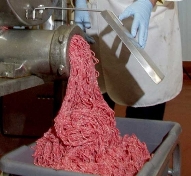Woman Paralyzed by Burger
 |
Ground beef is not a completely safe product.
—Dr. Jeffrey Bender, food safety expert
In a chilling reminder to all meat-eaters, Saturday’s New York Times recounted the tragic story of Stephanie Smith, whose meatborne illness almost killed her and left her paralyzed.
Two years ago, Smith was a dance instructor who ate a hamburger contaminated by E. coli bacteria, which happens when feces from cattle comes into contact with their flesh during the slaughter process—something that’s hard to avoid when the animals are forced to lie in their own urine and feces in barren feedlots and when they are hacked apart in filthy slaughterhouses.
Stephanie experienced stomach cramping that turned into bloody diarrhea. Then her kidneys shut down. Seizures, which knocked her unconscious, were so frequent that doctors had to force her into a coma. Nine weeks later, she woke up. The virus had ravaged Stephanie’s nervous system to the point that she can no longer walk, and doctors believe she will be bound to a wheelchair for the rest of her life.
The name “E. coli” comes from “colon,” where E. coli is found. In other words, anything that comes into contact with feces can be contaminated. While raw vegetables can be cross-contaminated with meat or with waste runoff from factory farms, ground beef is the most common source of E. coli poisoning.
Ground beef is usually a mixture of the flesh of many cattle from several slaughterhouses. Stephanie Smith’s deadly burger contained “trimmings” from one slaughterhouse in Nebraska that kills 2,600 cattle each day. Other bits of the burger came from a slaughterhouse in Texas that kills discarded dairy cows and old bulls.
According to the Times, there isn’t any federal law requiring meat-grinding companies to test for E. coli. Many slaughterhouses put the fear of losing money in recalls before public safety and will only sell to grinders who agree not to do testing.
The company that made Stephanie Smith’s burger continues to sell its cheap bits and pieces of dead cattle to supermarkets, fast-food restaurants, and the school lunch program, so if a dose of E. coli doesn’t sound appealing, go vegan.
Written by Heather Drennan
